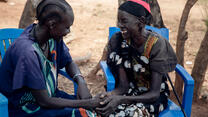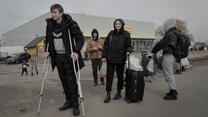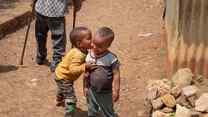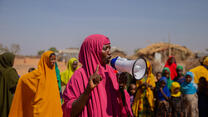No one should be forced to carry a pregnancy to term against their will. The ruling from the United States Supreme Court overturning Roe v. Wade strips millions of people of the right to control their bodies and to make the decisions that shape their lives, families and futures.
The toll of this decision will fall heaviest on already-marginalized people, including communities that the International Rescue Committee (IRC) serves. Experts project that the U.S., which already has high maternal mortality rates, will only see more people dying due to restrictions on abortion care.
As devastating as the impacts of the decision will be, access to safe abortion care is a critical issue far beyond the U.S.’s borders. Globally, and particularly in the fragile and conflict-affected countries where the IRC works, unsafe abortions are a leading cause of maternal death. These deaths are far more common where abortion is heavily restricted or banned.
Explore four reasons why safe abortion care is an essential global issue–and see how the IRC helps.
1. Abortion is common
Abortion is a simple procedure that can be delivered in a health facility or involve the use of medication (pills approved by the World Health Organization for ending a pregnancy, which can often be taken safely at home). The WHO states that, when carried out properly through one of the recommended methods, abortion is a safe health care intervention.
Abortion is a common experience and a central component of sexual and reproductive health care, occurring in every country and every community. In the United States, one in four women has an abortion. Around 73 million abortions take place worldwide each year.
Ultimately, the right to safely choose whether to carry a pregnancy to term is central to a person's autonomy.
The United Nations Human Rights Committee has stated that access to abortion is a matter of human rights, and regularly calls on countries to decriminalize abortion in all cases.
2. Restrictive laws lead to unsafe care
The evidence shows that restricting access to abortion does not reduce the number of abortions. What it does do is increase the likelihood of an unsafe procedure.
Deaths from unsafe abortion care are far more common when abortion is illegal or heavily restricted. For instance, according to the Guttmacher Institute, in the countries with the least restrictive abortion laws, less than 1 percent of abortions are typically unsafe. In the most restrictive, that number goes up to 31 percent.
In the United States, eight of the ten states with the highest maternal mortality rates have passed highly restrictive abortion access legislation.
You can find a map of abortion laws around the world here. Globally, the United States is an outlier, as very few other countries have restricted abortion in recent years. Instead, access to the procedure has been expanded in countries such as Colombia, Mexico and Ireland. Some countries, such as the Democratic Republic of Congo and Kenya, previously banned abortion in all cases but now allow it in certain situations, such as to preserve the woman’s life or physical and mental health, in cases of rape or incest and when there are severe fetal anomalies. All told, more than 50 countries have eased abortion restrictions since the early 1990s.
3. Unsafe abortions are a leading cause of maternal death
Unsafe abortions take place without the minimal medical standards and without the required expertise. Around 45% of all abortions are considered unsafe because they do not occur within these medical standards.
Complications from unsafe abortions can have severe mental and physical health implications, and account for approximately 4.7 to 13.2 percent of maternal deaths worldwide. This number is likely even higher in fragile and conflict-affected countries, where many may lack access to basic health care services.
4. Abortion restrictions impact the most vulnerable
Within countries and around the world, abortion restrictions inflict the most harm on low-income and already disadvantaged communities. This is because people with higher incomes and more resources are often able to pay for access to safe abortion care regardless of the laws where they live.
People fleeing or facing conflict and crises often encounter unique barriers to safe abortion care, or to accessing reproductive care more generally, including the collapse of health care systems, statelessness, lack of familiarity with new health care systems or a failure to prioritize sexual and reproductive health in humanitarian responses.
Women living amidst conflict are also often at increased risk of sexual violence. Under international humanitarian law, denial of safe abortion care for women and girls raped in conflict amounts to inhumane treatment and is a violation of their human rights.
The IRC has successfully argued that access to contraception and safe abortion care should be included in the package of services critical to meet health needs at the onset of a humanitarian crisis. Despite this, abortion care is routinely excluded from these responses.
Even in the U.S., barriers to equitable and quality health care persist depending on where a person lives, their income, ethnicity, language skills, gender, sexual orientation and more. Refugees and immigrants in particular face critical barriers. Many lack health insurance coverage or simply cannot afford the exorbitant costs of care. They also may run up against providers who do not provide the language access they need or who are not accessible via public transportation.
The U.S. falls behind other countries on key health measures which have been made worse by the pandemic. The new abortion restrictions will only exacerbate these health care disparities, incur great costs to the health care system and negatively impact on human lives.
The IRC’s work
The IRC seeks to help people regain control of their lives and futures, and this includes deciding if and when to have a child. We believe in prioritizing our clients’ right to safe abortion care, and commit to a feminist approach to our work and to delivering the highest quality health care to the people we serve.
The IRC adapts all of its programs, including those involving abortion care, to the context and policy framework in which we are working. Work involving safe abortion care is often provided alongside comprehensive reproductive and other health services, including access to contraception, maternal and newborn health care, and programs addressing gender-based violence prevention and treatment, childhood illnesses and malnutrition.
In other contexts, we also work to increase our clients’ ability to safely self-manage their abortion, in line with WHO guidelines. This prevents them from resorting to unsafe methods of abortion that could result in severe injury or death. This work is often done alongside work to help ensure access to comprehensive sexual and reproductive health services, including family planning.
In one project, we worked to reduce the incidence of unsafe abortion by offering counseling on abortion self-management through primary healthcare workers, community health workers, and pharmacists while simultaneously increasing local availability of misoprostol and mifepristone (the two drugs used in medication abortions).
The IRC in the U.S.
Abortion restrictions in the U.S. have a disproportionate impact on already marginalized communities: people of color, low-income people, and populations whose access to sexual and reproductive healthcare is often constrained or stigmatized, including transgender and non-binary people, incarcerated people, and undocumented immigrants.
These new restrictions are also being implemented in a country with some of the highest maternal mortality rates among wealthy countries. These risks are exceedingly unequal: Black women’s risk is nearly three times that of white women.
Among those most impacted will be the refugees and immigrants that the IRC serves through our 29 offices across the country. In line with our humanitarian principles to deliver the highest quality care, the IRC will continue to provide information and services to refugees and immigrants that promote their ability to regain control over their lives and futures. The IRC assists clients in learning to navigate the U.S. health care system and to access services that enable their health and wellbeing, including their sexual and reproductive health. For example, the IRC in Atlanta offers the Health Improvement Project for Teens (HIPTeens) an evidence-based, sexual risk reduction intervention for adolescent girls that enhances knowledge, increases motivation, and teaches skills needed to reduce pregnancy, HIV and STI risk.
Although the legal landscape will continue to shift, it is clear that both the people we serve and our staff who reside in states that choose to restrict abortion rights will find it harder to access the care they need—with grave consequences for their physical and mental health.
As an organization committed to a feminist approach and to gender equality, the IRC believes the right to access abortion care is central to a person’s autonomy and ability to make decisions about their future. Nothing will change that belief or weaken that commitment.



